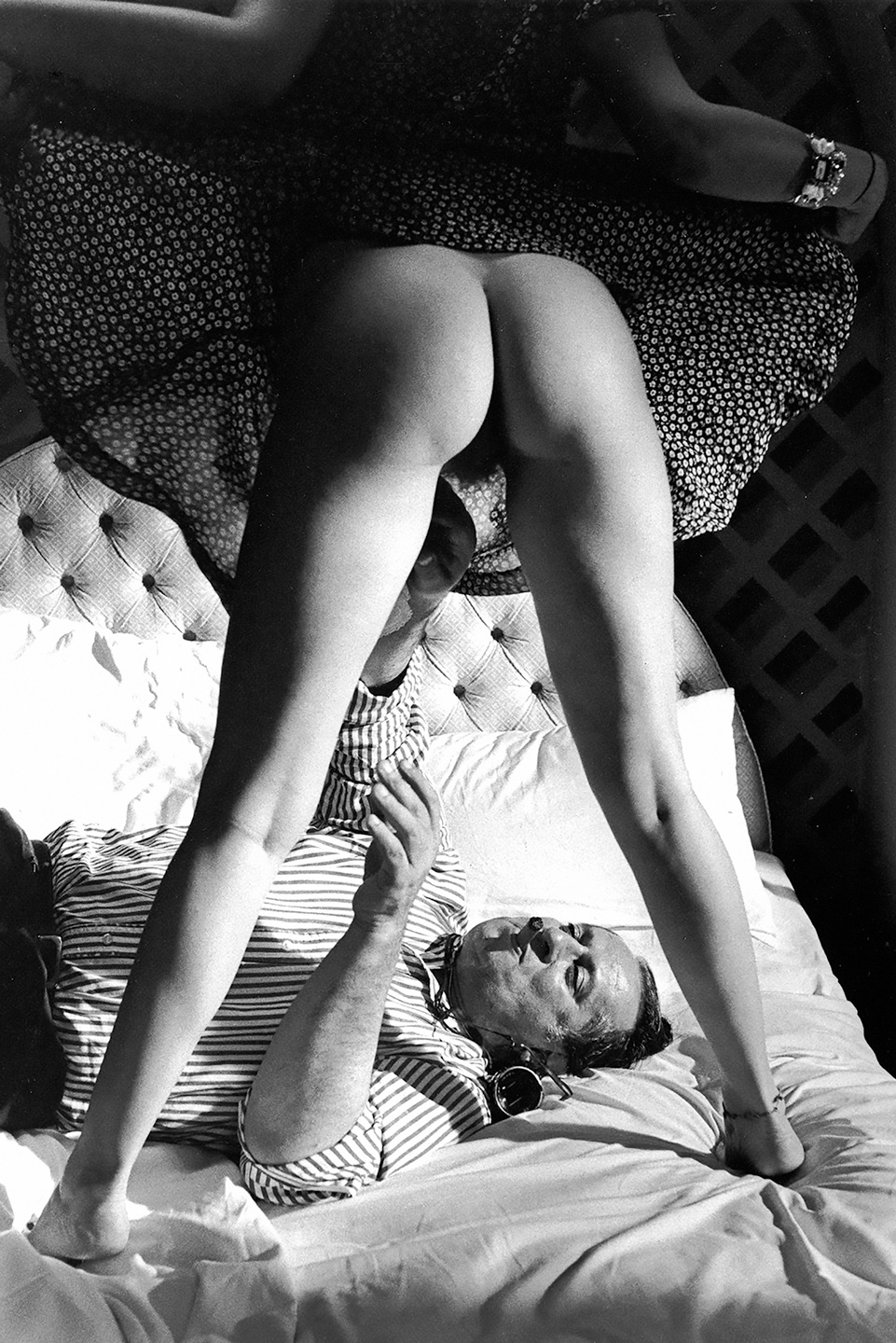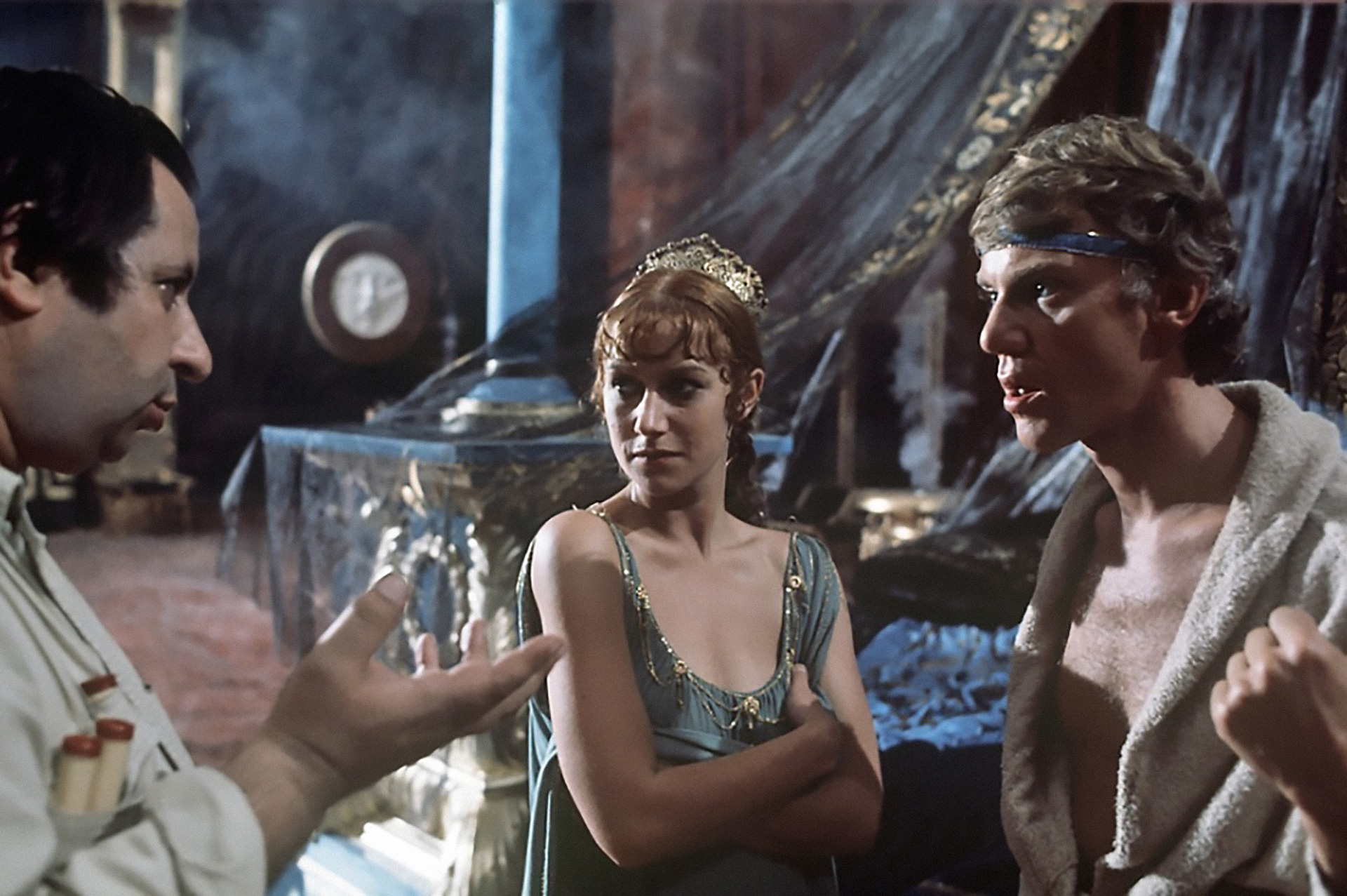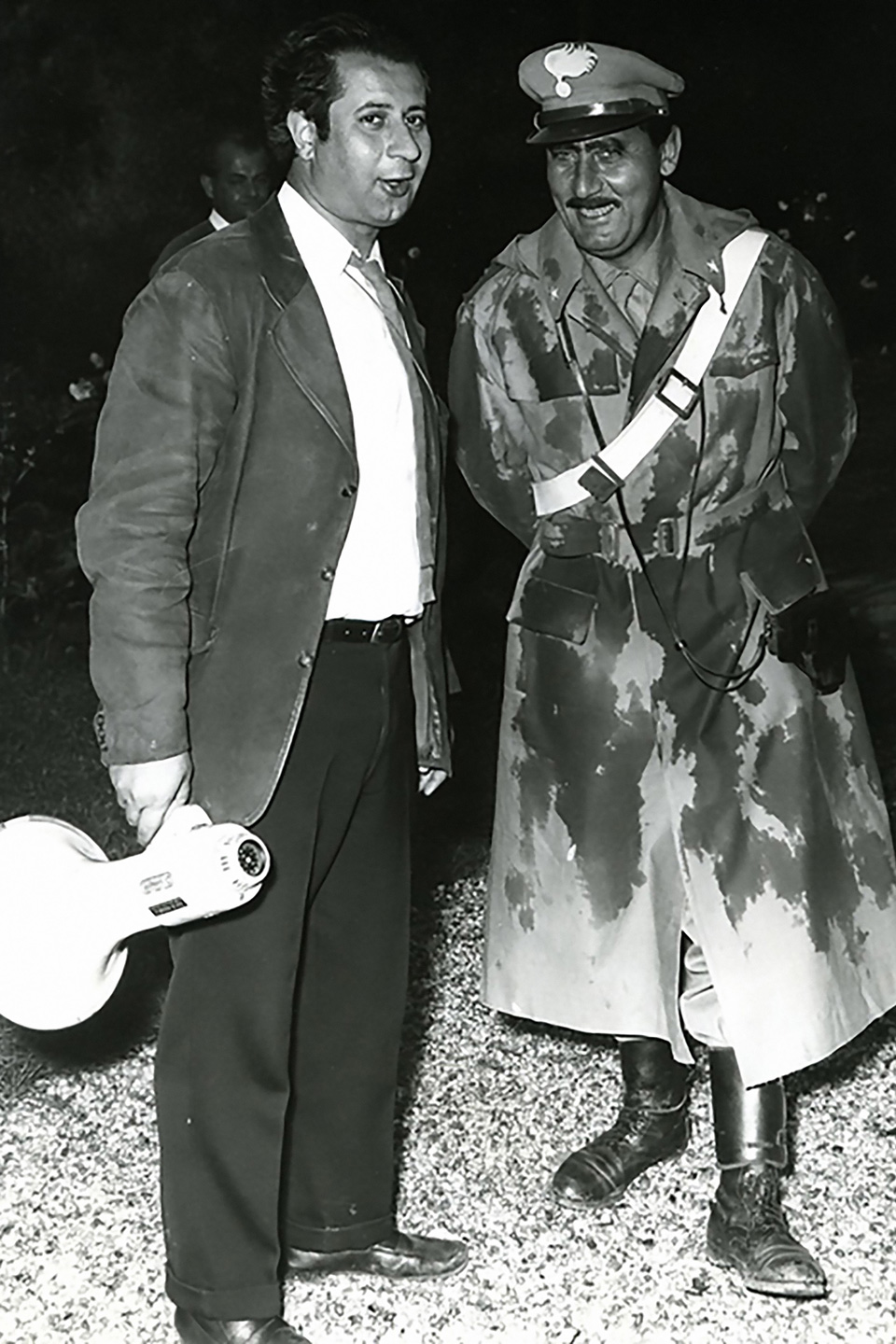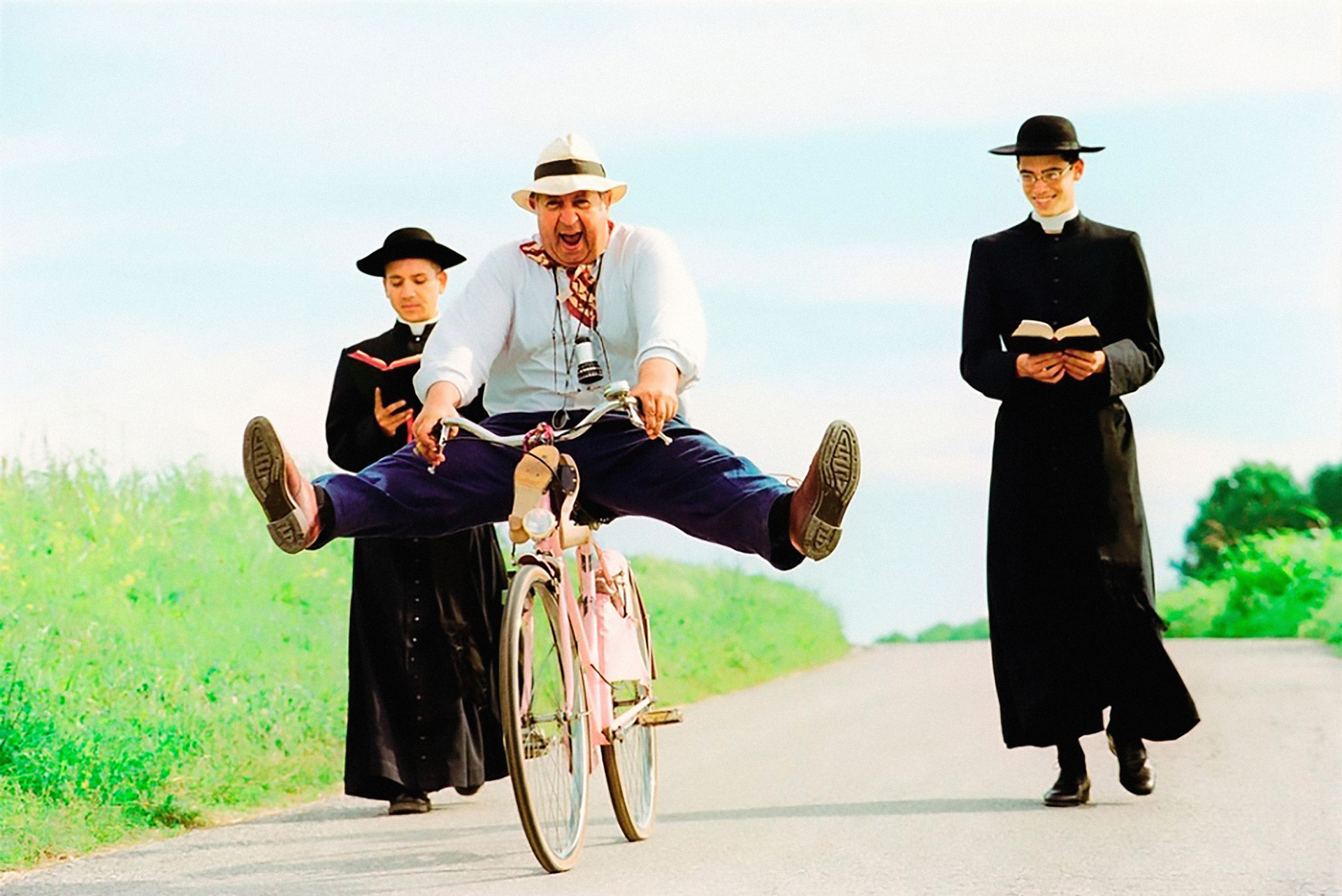A chat with legendary director Tinto Brass
in conversation with Valentina Barzaghi
All images from Tinto Brass Archive

-
In 1963, Brass made his directing debut with the film Chi lavora è perduto (previously released as In capo al mondo), an anarchic apologue about disaffected youth: the story of a young man with a hostile relationship towards institutions, who cannot find his place in society. During the 1960s, he mainly made political cinema but, as for so many others of his generation, ’68 was a breaking point. Disillusioned and saddened by the lack of real changes enacted by the struggle, he decided to change genre and began to concentrate on eroticism as an authorial break from the past.
-
And it didn’t take him long: Brass was in cinemas with The Howl (with Gigi Proietti and Tina Aumont), the story of a female protester who decided to take back her liberty on the eve of her wedding, in 1968 but by 1969 he had released Nerosubianco, his first erotic film. It was here that the director tackled the topic of betrayal for the first time, no longer seen as a taboo but as a source of renewed energy within the couple, a theme that would be thoroughly investigated in almost all of his cinema to come. Brass also introduced his proverbial obsession with the female behind in this film, as well as telling the story of love and sex between a white woman and a black man for the first time in Italian cinema.
-
The critics didn’t love it, neither did the feminists, and it was torn apart by censorship, but Brass stuck to his guns with films such as Dropout (1970), Vacation (1971) and Salon Kitty (1975), in which sex, free love and pacifism remained the dominant themes. The more his work was ridiculed, the more the director was convinced of its success. His skill behind the camera was indisputable however, so much so that he was asked to direct the colossal Caligula with Malcolm McDowell in 1979. It was certainly a more baroque production than his usual work, but involved all the themes that he held so dear. Brass, however, is an auteur who films and edits all his films and when the producers removed Brass from the editing process, he disavowed the film, in which only certain scenes display his unmistakable editing style.
-
The real turning point for Brass came in the ‘80s, the age of his great masterpieces, his iconic actors and the social revolution that we can perhaps only truly appreciate today. The same revolution, to come full circle, that Pasolini investigated in his documentary. Films such as The Key (1983), The Mistress of the Inn (1985), Love and Passion (1987), Paprika (1991) and All Ladies Do It (1992) are cult successes that deserve to be rediscovered in an age of profound female revolution such as our own. Working with women including Stefania Sandrelli, Serena Grandi, Francesca Dellera, Deborah Caprioglio and Claudia Kohl, Brass not only bares real, full and genuine female bodies on the big screen but also a way of living one’s own femininity free of constraint and constriction, where the woman actively determines her own fate, as well as her sexuality. Brass’s women are happy and spontaneous and they abandon themselves to pleasure with no preconceptions or taboo. There are never passive spectators within the couple, but use dynamics and intrigue to keep their relationship alive. Their partners were almost always led by the feline initiative and the yielding beauty of their companions and lovers. Although Brass was superficially reduced to the simplistic epithet of ‘lecher’ (how to forget my schoolmates who, years later, still treated his work as hot material to exchange during solitary or mutual sessions) and his beloved rear ends became somewhat more of a marketing tool than a recognisable trait of his cinematography, the director was a forerunner of a new vision, both in terms of eroticism on the big screen and of women in society.
Everything we make is custom-developed, we work very intensely. I really like traditional, historical menswear, and I imagined an inner sanctum where powerful people are sitting around running the world.

-
Many other films followed in the wake of this fecund production, from Frivolous Lola (1998) to Black Angel (2002) and Monamour (2005), but the five films listed above remain his greatest work. I can honestly say that, susceptible to preconceptions myself, I came late to Brass’s work. It was at university when, avid for any form of non-mainstream cinema, I rented his films and discovered a whole new world. I am envious of anybody who still has that discovery ahead of them and it is great to see his name on the lips of so many young people, especially young women, a sign that his work has meaning even now.
-
On the 17th of June, I went to Tinto Brass’s house: a beautiful converted stable outside Rome. He was waiting for me on the sofa, extremely elegant in striped silk pyjamas and his iconic red glasses. Along with Tinto Brass, Caterina Varzi was there to welcome me, his muse and guide since he was struck by a sudden illness in 2010. I had a powerful urge to hug him. No, I didn’t, but I would really have liked to. It wasn’t just a matter of how formative his cinema had been for me. Were that the case, I would probably already be in trouble for affectionate assaults on many of the people I meet and interview for work. I wanted to hug him because, what with the critics, censorship, feminism and prudishness, nobody has truly recognised what Brass did for our genre films, of which he remains an indisputable maestro.
-
Entering his house was exactly as I had imagined: cigar boxes piled up on the living-room table, phallic statures and posters of his films or erotic paintings. I had wanted to do this interview for a long time and I was a little tense, but, ironic and a little wary, Brass immediately proved to be an excellent companion.
-
VB‘Love Meetings’ is the fantastic documentary that Pasolini made in 1963 and which inspires this issue of Alla Carta. The film recounted the relationship that Italian people had with sexuality – and all the taboos that came with it – in those years. What do you think has changed since then?
-
TB[he laughs] Well, a lot has changed. To begin with, there was hope in those years, the hope that what you were doing might influence the political or social situation. There is no longer that kind of hope, there is only an assumption of complicity that makes people believe they can still hope, when that is no longer the case.
-
VBSpeaking of sexuality and taboo, is there anything that we say we do nowadays, but which we don’t really do because we still censor ourselves?
-
TBI don’t think there are any real taboos today, or rather, there are no longer taboos that we can investigate at a social level, as there were in the 1960s. Some more private and intimate aspects remain taboo. When it comes to sex, for example, the restrictions that were in place when I was making films no longer exist. When you think of how women have more power nowadays, in relationships and eroticism, you realise how much has changed and how many taboos have been smashed.
-
VBAnd what is your opinion of men nowadays?
-
TBNot good. Really not good. [he laughs] It’s as if they are scared, as if they have withdrawn.
-
VBThe reason that I am here and such a big fan of yours, is because over time I discovered a sort of free, joyful and natural femininity, free of fear or inhibition, thanks to your films and those magnificent women. Yet, we must admit, you were never particularly loved by feminists of your age. What do you think it was that they never understood about your cinema?
-
TBThey never understood anything. [he laughs] They never really tried. Only Camilla Paglia recognised the merits of having uncovered and depicted a type of female personality that was non-existent in society back then, yet real and ready to emerge at the same time. She really supported me in that.
-
VBWhich of your characters is most feminist?
-
TB[he laughs] I don’t know. Perhaps Miranda. Or perhaps all of them, in their own personal way.
-
VBCould I ask you to define love?
-
TBNo. [he laughs] I cannot define it because that would mean it was something finite, whereas love is any manifestation through which we completely express ourselves. The quintessential expression of love towards another human being, with no distinctions of gender or anything else, remains sex for me of course.
-
VBSo, what is the difference between love and sexuality?
-
TBBe careful, there is a difference: love is more noble than sexuality. Sexuality is only one aspect of love, it does not contain all its nuances.
The quintessential expression of love towards another human being, with no distinctions of gender or anything else, remains sex for me of course.

-
VBWhat have been the hardest parts of your work as a genre director over time?
-
TBI think censorship, which prevented me from expressing myself as I wanted to in my films in a thousand ways. After all, from a cultural perspective, eroticism represented a sort of ideological derailment for me, which didn’t sit well with the powers that be of course, because in reality it represented the fact that I was against every form of power. It is no coincidence that my work began with political film before moving into eroticism. And even there… the eroticism was never understood in its purest form so even this other interpretation was rejected.
-
VBYet by doing things your way, you became one of the great auteurs of our cinema. You are aware of that, aren’t you?
-
TB[he laughs] I am pleased that now, with time, others can also recognise and understand that I was expressing both a way of being, by which I mean sex, and an interpretation of the era. My sex was free, light-hearted and joyful and I tried to use it to break down the barriers and taboos of my age. By showing that sex did not have to be all guilt and damnation, but joie de vivre, I revealed the society of my age. Returning to what we mentioned earlier about feminism: I believe that women today, more so than back then, are able to understand my attempts at subversion through my films and my characters. Even though I am a male director, I believe I did somewhat revolutionise the figure of the woman within the erotic imagery of the past, transforming the woman from an object to a subject. It is no coincidence that it is now women who publish my books or finance my exhibitions. Say what you like, but never say that I haven’t always loved women more than anything.
-
VBSpeaking of the past, can we contextualise The Key, which was the real turning point for you?
-
TBThe Key is from 1983 and it is from the same time in which the need to depict sexuality as a source and vehicle of freedom came alive in me. Those were very important years for me, professionally speaking, because I experimented extensively. I depicted sex as I saw it, for both men and women. My transition from political cinema to erotic cinema happened because, in my personal experience, I saw the ideals that had upheld the former fail. After 1968, my political experience totally changed, because I was disillusioned. Although eroticism is something personal to the individual in my opinion, erotic language is universal and can therefore reach everybody. Given that in sex, especially in those years, I saw the same attempts at repression that I had observed in the political sphere, dictated by an imposed social regime, I adopted it as a theme to derail power. The Key was a fundamental piece of work because, although I had always had this idea of sex, it was the first time that I had the courage to depict it how I wanted – I had been a bit ashamed before.
-
VBDo you think there any Italian directors representing our age, in their own way, nowadays?
-
TBI couldn’t really say: I don’t really take an interest in our cinema nowadays because I don’t think it expresses or develops in any way the themes and issues that have always interested me, such as the male/female relationship. Moreover, I don’t think I would find any ‘successors’ to my cinema today, not even among the people who have worked with me in some capacity over the years. Every so often I think that a woman, more so than a man, might fulfil that role, because of the type of vision I had of my characters.
-
VBYou did rather anticipate the modern women: independent and aware of her erotic potential. And furthermore, there was never any fake or fairy-tale sex in your films, which is what we often see in contemporary cinema. It was real, sometimes awkward. How many women could have been helped to forget Prince Charming had they seen your films?
-
TB[he laughs] Plenty. Women read Fifty Shades of Grey now and don’t realise that what permeates their imagination is not so much the sex, but a male figure that doesn’t exist. Fixating on that model, which is in fact a modern Prince Charming, means creating huge illusions about life. In my films, on the other hand, women were so emancipated that the male personalities existed on the margins of their existence. Their approach to life and sex was real and natural, I never wanted to write fairy-tales. I used my films to talk about relationships and the things that were never mentioned back then, but which have always existed.
My sex was free, light-hearted and joyful and I tried to use it to break down the barriers and taboos of my age. By showing that sex did not have to be all guilt and damnation, but joie de vivre, I revealed the society of my age.

-
VBCould you define some of your most famous actors for me?
-
TBStefania Sandrelli Spontanous. Serena Grandi She was like a watermelon, every bit of her to be enjoyed. Deborah Caprioglio Beautiful and strong. Claudia Koll Very talented and spontaneous. It was a shame that we didn’t work together again. I called her after we made the first film together, but she said she absolutely couldn’t do another one. Caterina Varzi She is very important: she gives me everything and more. When, or if, I manage to make a film with her in, it will be a great event.
-
VBYour protagonists were all very joyful and full women (both aesthetically and by nature); women who men have never stopped liking. If you had to choose a muse for one of your films today, who would it be?
-
TBI have Caterina in my life, I would choose her. She is the only one. I have always defined her ‘the beauty and splendour of the truth’ because she has an overwhelming carnality. The truth is, we were supposed to make a film together but it doesn’t look like it will be possible. After my illness, it is hard work for me to edit a film meaning I would need an assistant with all the costs that entails.
-
VBIs there any reason why you didn’t work with some of the great divas of erotic cinema in the 1970s?
-
TBLaura Antonelli, she didn’t want to work with me. Edwige Fenech,we spoke, but nothing came of it. Barbara Bouchet, we met, but we never made anything. Lory del Santo, same again, we met but nothing came of it. Nadia Cassini, beautiful, we met but again nothing. I saw them all back then, but not all projects come to completion, as you know, and therefore not all collaborations. Of all the women you mentioned, the actor with whom I most wanted to make a film was Antonelli, but I can tell you that I never wanted anybody the way I wanted Tina Aumont. I had created a character for her in a film that never saw the light of day, entitled Ziva. But then she sadly died while we were discussing it. I then wanted to make it with the only woman that could have replaced her – Caterina. I wrote another screenplay for a film that hasn’t been produced with Caterina in mind, called A sangue caldo, based on the story of the Marchesa Casati.
-
VBWho were your great masters and what did you learn from them?
-
TBJoris Ivens, who taught me the art of editing which stayed with me throughout my career. Roberto Rossellini, who gave me the chance to express myself through film as nobody had before then. Alberto Cavalcanti, because he encouraged me to make the cinema I truly wanted to make.
-
VBYou have always been totally intransigent about editing, making it one of the fundamental aspects of your career, both positively and negatively.
-
TBThe editing has always been of absolute important for me in my films. I would generally have three cameras on set, positioned simultaneously in different angles, and that’s how I would film every scene, because I knew that I would later give every scene the appearance and rhythm that I wanted. The editing is what gives the film its real style (his own has been named ‘Brass style’, Ed.) and therefore if I couldn’t do it myself, I disavowed the work, as was the case with I, Caligula.
-
VBHave you ever been upset because of somebody’s opinion of your work?
-
TBAbsolutely not. [he laughs] They could say as many horrible things as they liked and I didn’t care. The day after my films came out, I would buy all the papers and open them up, side by side, on the floor of this room. Then I would choose whichever one gave the worse review and say “Here, this one really got it”. [he laughs] The worse the review, the more I was convinced the film would be a success.
I am very romantic. As Caterina says “I am a libertine with a vocation for relationships”.
-
VBAre you happy?
-
TBYes, definitely. Both because of what I have done and because of what I have built with Caterina, for so many reasons. I am so very happy that we are going to get married. I will finally be able to go in peace: I know that everything I have is in the hands of somebody who loves and respects me.
-
VBSo, you believe in marriage as an institution? You’re a romantic when it comes down to it.
-
TB[he laughs] Yes, of course, I am very romantic. As Caterina says “I am a libertine with a vocation for relationships”. I believe in marriage, I believe in it as a form of safeguard: I want Caterina to be protected and I want her to protect me. And then, of course, marriage is also a vehicle for betrayal, a theme dear to my work, as well as a tool for increasing passion. If there’s anything that I have always believed in, it is love and the relationship.